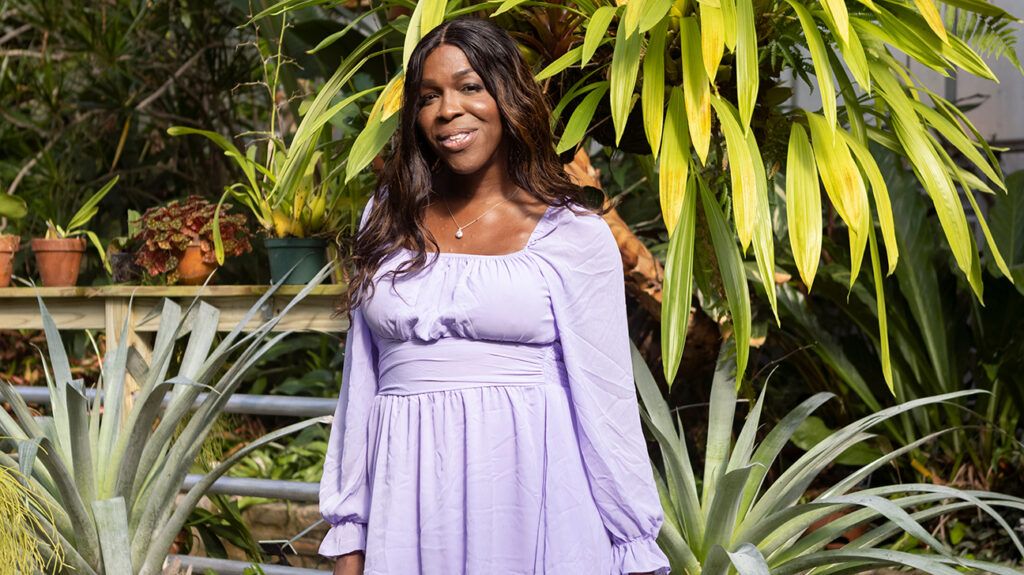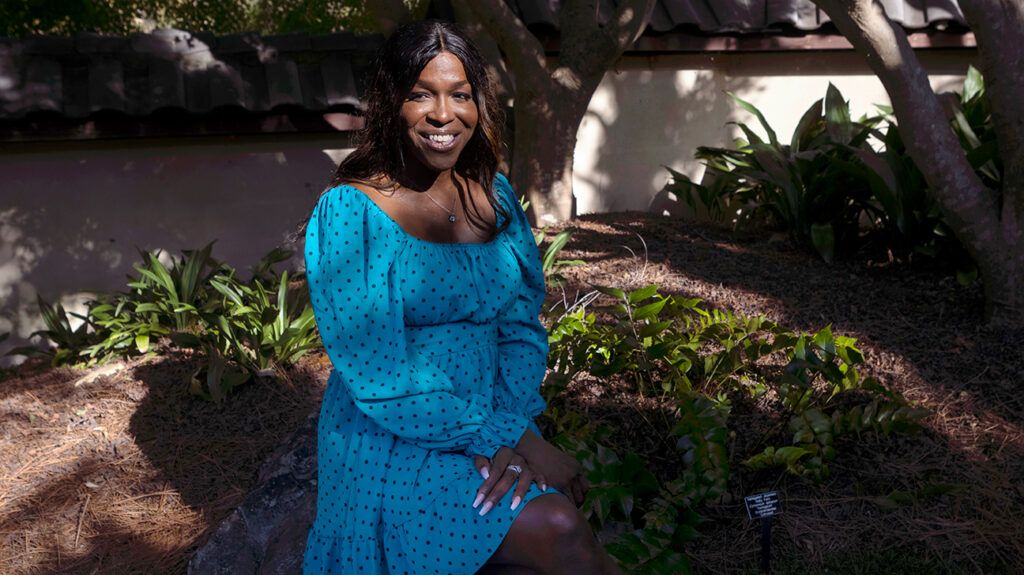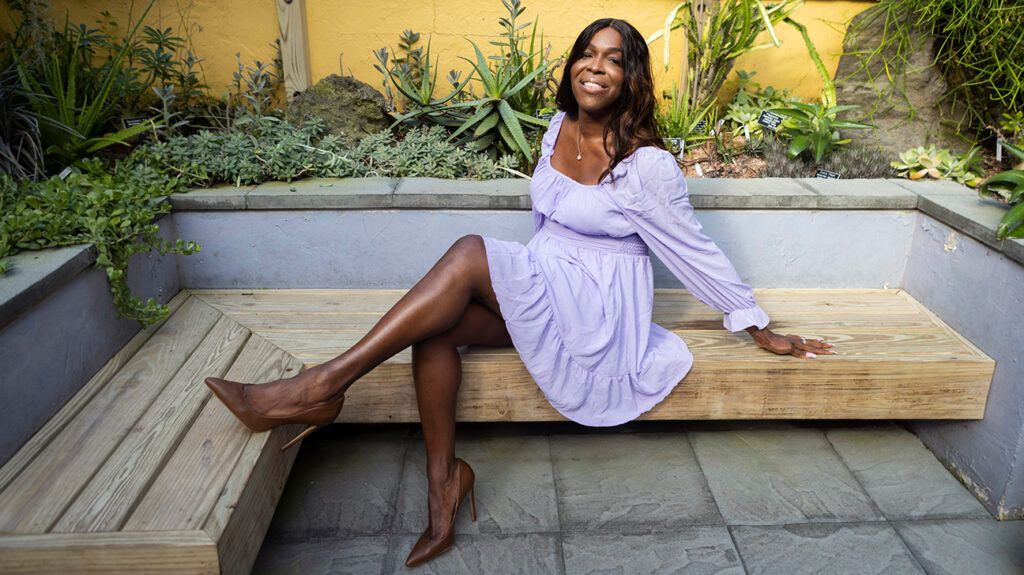Black trans women are one of the most vulnerable populations in the U.S., but also one of the most underserved. BEAM seeks to fill this gap.

Transgender Women of Color face many issues due to discrimination. These issues range from employment to housing, and even overt violence.
And, many aren’t insured — nor do they have health insurance that covers mental health.
This lack of access to mental health services isn’t new in historically marginalized communities. Efforts to provide services for trans women are simultaneously underfunded.
The Black Emotional and Mental Health Collective (BEAM) is helping move these efforts along by creating an opportunity for people who are already doing the work to have a better opportunity for it to flourish.
BEAM’s work includes grant-making to support community organizers, mental health wellness, support groups, and other services in the Black community.
This November, thanks to the BEAM and Healthline Media partnership, the Black Wellness Innovation Fund will be able to expand its services to include Black trans women’s wellness as one of the focused programs.
Yolo Akili Robinson, Healing Justice Worker and founder of BEAM, hopes to receive out of the box and fresh ideas when the application opens.
When selecting the committee for the fund, Robinson felt strongly that trans women had a hand in the process, since he felt it was not his place to determine which projects were selected.
A selection committee composed of trans women who are doing great work in the community are leading the process. One of the individuals on this team is Aryah Lester, deputy director of the Transgender Strategy Center.
Lester started a new brand management company, Lester & West Associates, geared toward people who are aiming to build their brands and break into entrepreneurship while navigating the system as a person with marginalized identities.
We chatted with Robinson and Lester about the importance of this partnership with Healthline Media, and the development of this fund to the wellness of Black trans women.
These interviews have been edited for brevity, length, and clarity.
How did this partnership begin?
Robinson: It was actually almost serendipitous. It was something we were thinking about. We were kind of surveying the landscape of Black wellness in the country and seeing how we talk about the disparities that Black trans women experience when it comes to violence and mental health distress.
And yet we don’t see, in my opinion, a comparable public health response as it relates to the wellness and mental health of Black trans women.
My belief is that when it comes to any community, it’s important to provide the community with the resources they need to help them heal themselves, because there are people in our communities who already know how to do the work.
What sort of work are you looking to highlight and fund?
Robinson: What we’re looking for broadly is Black women who already have a history of doing the work, and we’re looking at how it connects with mental health and wellness. There are a lot of intersections that wouldn’t necessarily be considered mental health, but are considered that way to us.
Lack of access
Sometimes, a lack of access to basic needs being met can appear as a symptom of a mental health condition, but it’s not always that.
“Particularly talking from a clinical perspective, so many diagnoses mimic ‘aggravated,'” Robinson says. “Yeah. Because they haven’t eaten in 3 days. Maybe it’s not depression.”
What are you hoping comes out of this Black Trans Women Wellness Grant?
Robinson: One, we’re going to capture some nice evaluation data about the impact of the interventions they [the selected applications] create. So, we’ll be able to produce some really accessible evaluation imagery that can circulate on social media and that other people can see.
It’s about supporting communities with real, tangible care and material support. For me, it’s also about, ‘How do we push more people to do more like this?’
We should be giving Black trans women more money to do this work. My hope is that we’ll not only have the visibility of the project, while also raising the voices of the judges and winners, but we’ll also have the visibility of their work, leading to them hopefully getting supported.
Not only that, but we’ll also have this robust data to show that this works as an intervention.
That’s why it’s called the Black Wellness Innovation Fund. We want to innovate how the field is thinking about mental health and wellness.
What is the importance of a grant process like this one?
Lester: [In] 2020, we really kind of came to a crossroads when we look at the racial tension that has been boiling up since inception of this country all the way up to the freedoms of women and gender rights and economic rights. Then couple that with xenophobia, which is closely related to transphobia.
So when I’m looking personally at all of those intersections, someone like myself — a Black woman of transgender experience — is the one common denominator of all the oppressions that we see here, both in our country and within our current state here in 2021 going into 2022.
When we’re looking at how to approach the subject of a community that has been so oppressed, mental health is one of the top priorities.

Barriers to access
When it comes to barriers to accessing mental health for folks with marginalized identities, especially those that live within intersections: “Society is set up against us as Black people, as women and feminine-identified people, and certainly with anything that society doesn’t determine to be the norm,” Lester says.
What is the necessity of cultural competency in this work?
Lester: Having access to affirming mental health is really important, finding the right type of Black therapists that are able to guide us through navigating and traversing all the obstacles and the barriers, and at the same time, trying to find little ways of engaging in self-care that work for us that may not be the traditional ways that people look at it.
What are you hoping to see more tangibly come out of this grant process?
Lester: Greater visibility to the realities of our lives.
I really like to just lay it all bare, because that’s how we dismantle systems — just laying it all out, so that we can really look both on that grand scale, but then introspectively as individuals.
Each person can say, “Okay, what do I need to unlearn that has been taught to me, so I can be the best human that I can to anyone else that’s here alive on this planet with me?”

What are you most looking forward to, personally, about being involved in the process?
Lester: Anything that has to do with BEAM is always dear to my heart because it intersects with my Blackness and with me as a woman of trans experience, and as a part of the gender spectrum that’s often overlooked.
Then, I’ll be able to help other organizations that are often overlooked to really get what they need and give them needed support. These organizations are the ones that are really doing the hard work and putting in the labor and actually helping people in their day-to-day lives.
How excited are you both about this initiative and the idea of innovation?
Robinson: BEAM supports more traditional routes of healing — such as talk therapy or Reiki. But I’m also a proponent of efforts that engage people’s hands, hearts, and promote connections that feel innate to Black culture.
People call it “kitchen table healing.” I believe that’s what Black folks have been doing as our therapy for a long time.
Those are interventions that I’m really curious to see, and there are so many Black trans women I know who have been holding dinners and feeding community members.
Lester: Innovation is something that I think is a powerful weapon for all of us, especially those of us in the movement, to kind of shake the wheels a little bit.
So, looking for something that’s creative, but deeply rooted within our culture in some type of way is just healing ourselves and being attentive to our mental health as a cultural practice.
How do you apply for funding?
Applications for the grant process will open in November.
To learn more about how to apply, you can reach out to BEAM at admin.account@beam.community. You can also find out more about the fund and who it helps here.
